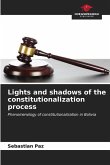In a historical retrospective of the formation of the State, we seek in this work to trace the origins and importance of the fundamental right to proficient government - or administrative probity, a contemporary expression - for democracy and citizenship, fundamental elements of the Rule of Law. Adopting the figure of a historical axis, we trace the evolution of the state chronologically, observing its most important political aspects from the historical perspective of Europe - and also the Near East - as this is considered to be the forerunner of Western civilisations. Thus, we realise that as early as the Ancient Ages, there was an expectation on the part of the subjects that the sovereign - considered to be a god or representative of the gods - would govern in a proficient manner. With the historical affirmation of human rights, this expectation is recognised as a value of the state and rises to the status of a right, becoming enshrined in most legal systems as a principle. Having passed the stage of positivising the right to administrative probity or a proverbial government, we are concerned with the issue of making the defence of this fundamental diffuse right effective, both in the material and procedural fields.
Bitte wählen Sie Ihr Anliegen aus.
Rechnungen
Retourenschein anfordern
Bestellstatus
Storno








